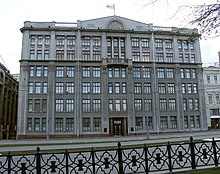Central Committee of the All-Union Communist Party (b)
|
Central Committee Центральный комитет Tsentralniy Komitet |
|
|---|---|
 |
|
| Leadership | |
|
Leader
|
|
|
Elected by
|
the Party Congress
|
|
Responsible to
|
the Party Congress
|
|
Responsible for
|
Central Committee Commissions, Central Committee Departments, Politburo, Orgburo, Secretariat and party bodies in general
|
| Seats | Varied |
| Meeting place | |
 |
|
| Staraya Square, Moscow, Russian SFSR | |
The Central Committee of the Communist Party of the Soviet Union (Russian: Центра́льный комите́т Коммунисти́ческой па́ртии Сове́тского Сою́за – ЦК КПСС, Tsentralniy Komitet Kommunistitcheskoi Partii Sovetskogo Soyuza – TsK KPSS), abbreviated in Russian as ЦК, "Tse-ka", was de jure the highest body of the Communist Party of the Soviet Union (CPSU) between Party Congresses. According to Party rules, the Central Committee directed all Party and government activities between each Party Congress. Members of the committee were elected at the Party Congresses.
During Vladimir Lenin's leadership of the Communist Party, the Central Committee functioned as the highest party authority between congresses. However at the 8th Party Congress held in 1919, the Political Bureau (Politburo) was established to respond to questions needing immediate responses. Some delegates objected to the establishment of the Politburo, and in response, the Politburo became responsible to the Central Committee, and Central Committee members could participate in Politburo sessions with a consultative voice, but could not vote unless they were members. Following Lenin's death, Joseph Stalin took power in the Communist Party through the office of General Secretary of the Central Committee, the leading Secretary of the Secretariat. With Stalin's takeover, the role of the Central Committee was eclipsed by the Politburo, which consisted of a small clique of loyal Stalinists.
By the time of Stalin's death in 1953, the Central Committee had become largely a symbolic organ that was responsible to the Politburo, and not the other way around. The death of Stalin revitalised the Central Committee, and it became an important institution during the power struggle to succeed Stalin. Following Khrushchev's ascension to power, the Central Committee still played a leading role; it overturned the Politburo's decision to remove Khrushchev from office in 1957. In 1964, the Central Committee ousted Khrushchev from power, and elected Leonid Brezhnev as First Secretary. The Central Committee was an important organ in the beginning of Brezhnev's rule, but lost effective power to the Politburo. From then on, until the ascension of Mikhail Gorbachev, the Central Committee played a minor role in the running of the party and state – the Politburo was the highest political organ in the Soviet Union.
...
Wikipedia
